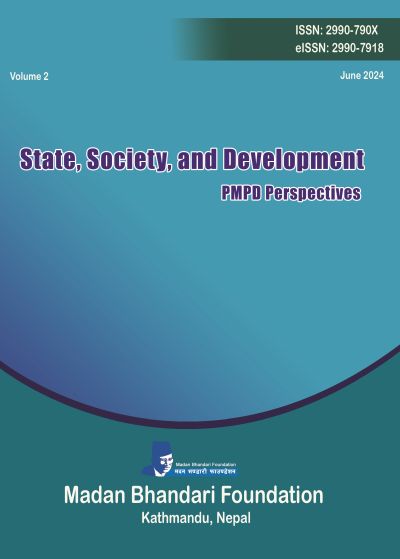Parliamentary Intervention and Bikas: Former President Bhandari’s Motion for Mahila Empowerment
DOI:
https://doi.org/10.3126/ssd.v2i01.67188Keywords:
Mahila, Gender equality, People’s multiparty democracyAbstract
The Communist Party of Nepal—Unified Marxist-Leninist (CPN [UML]) has undergone significant political transformations since 1949, particularly reflected in its political and election manifestos. I have introduced a procedural periodization model to assess mahilas’ (women) advancement within the ideology of People Multiparty Democracy (PMPD). Former President Bidya Devi Bhandari’s “motion of urgent public importance” in Parliament in 2006 marked a notable biash (advancement) in the PMPD gender aspect. This study traces the evolution of mahila ideology within PMPD through four periodizations: formation (Node, Scale-Up, Party Building), guiding principle, intervention, and bikas. It builds on the philosophy of onto-epistemological determinants and co-determinants, embedded in social justice theory. Employing archival research and qualitative interviews, the study utilized election manifestos and interviews. These interviews with mahila motion architects reveal philosophical underpinnings, theoretical influences, political landscapes, and practical challenges, portraying a movement for equality born from past struggles and political realities, shaping Nepal’s path toward inclusion. The motion exemplifies collective action and national unity in advancing gender equality, democratic justice, and social change through solidarity. The study claims: i) Nepal is moving towards inclusive democracy; ii) the party’s fundamental principles evolved through the interplay of strategies, policies, initiatives, and encounters; iii) further legal interventions are required to uphold PMPD’s evolving guiding principle as an urgent public motion for mahila; iv) this analysis model could be applied to other dimensions of PMPD to advance it at ‘thought’ level; finally, the CPN (UML) must deliberate on whether to prioritize ‘mahila’ or ‘women’ in its ideological discourse.
Downloads
Downloads
Published
How to Cite
Issue
Section
License
Once published, an article in this Journal is not permitted to publish in other journals or similar publications without the permission of the Foundation. Contents and perspectives presented in the articles in the journal are solely of the authors.




